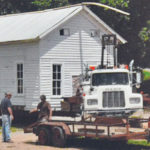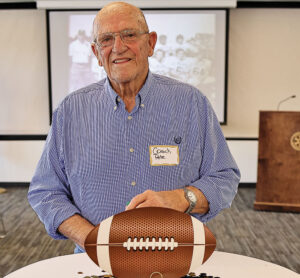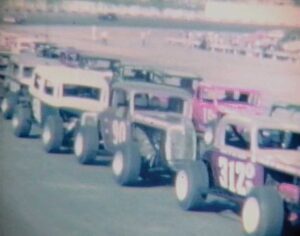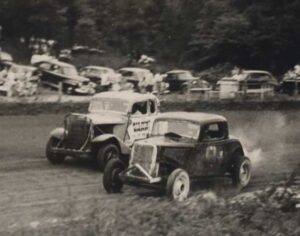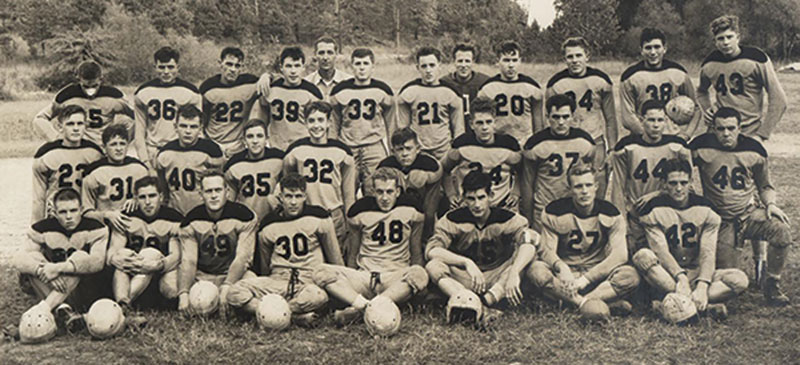
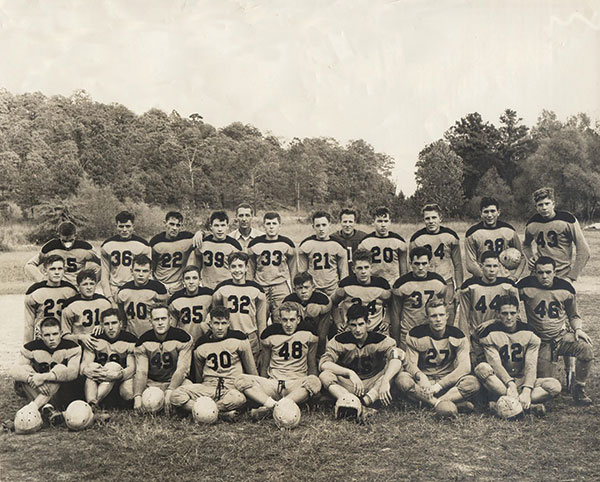
Story by Paul South
Photos by Mike Callahan
Submitted Photos
In the 1970s, like generations of little boys before and after him, David Gulledge lived for fall Friday nights and Pell City High School Panther football.
Growing up in Avondale’s Mill Village, the gleam of the stadium lights was for Gulledge and his pals, the stuff of hopes and heroes. And joy could come from something as simple as a shred of fabric from Panther running back Wayne McCoy or quarterback Jay Grogan, or future Florida State All-American Ken Roe.
“When I was a kid growing up, that was back when they had tear-away jerseys,” Gulledge said. “I remember looking up and admiring all those folks. I was one of those little kids standing by the fence waiting to get a piece of one of those tear-away jerseys.
“If we were fortunate, we’d get the whole jersey, tie it into a ball and go play football up on the hill,” Gulledge added with a laugh. “Friday nights, as in most towns, mean the town shuts down and comes together.”
Gulledge would grow up to be one of those Pell City Friday night warriors, a three-year starter at quarterback who would later play at Jacksonville State and in the NFL. His is just one of the many stories that course through the 100 years of Pell City High School football.
Friday Night Lights
The impact of Panther football reaches from some not-so-auspicious beginnings – like a 95-7 loss to Anniston Presbyterian in 1921 – to undefeated seasons and to pro football’s biggest stage. Pell City lore includes Bobby Skelton, who quarterbacked Coach Paul “Bear” Bryant’s first bowl team at Alabama. Skelton would later become an SEC and NFL official, part of the crew for one the most exciting Super Bowls, San Francisco’s win over Cincinnati. Grogan would also play for the Tide, part of a host of Panthers who would go on to play college football.
Pell City teams would endure the trials of losing seasons and the triumphs of winning ones. But every game night, the town would come together to cheer the sons of millworkers and merchants, lawyers and doctors.
“Friday night, it’s like the town closes down and everyone is there to support the program and it just kind of brought the community together,” Gulledge said.
Retired attorney Bill Scott knows Pell City football as well as just about anyone. For 25 years, Scott, a former Panther player, helped haul the sideline chains at Pete Rich-Alumni Stadium. Chat with him long enough and he’ll talk about Coach Will Glover, Pell City’s winningest all-time coach, (81-39-6), a mythical state title in 1951 and a tradition of great teams, players and coaches.
The 1951 team, led by All-State end Bobby Golden went 10-0 and allowed only 63 points for the season. The Birmingham News tabbed the Panthers the Class A state champions in the days before the statewide playoff system.
The Panthers made their first playoff appearance in 1974 and captured their first playoff win and region championship the same year. In 1986, Gulledge helped lead the team to its first 11-win season. And in 1993, Pell City earned its first 12-win campaign. Across its history, Pell City has won eight area or region titles, according to ahsfhs.org
Glory Days
Glover led the Panthers in what many consider the golden age of Pell City football. Scott, along with former Panther star Charlie Gray, even helped Glover by scouting the next week’s opponents. Gray “thought the world” of Glover, a beloved Panther head coach, who helped build the stadium with his own hands.
Glover was a fiery competitor, a fever that sometimes spilled into the crowd.
“We are a country town, but especially back then,” Scott remembered. “People in the neighborhood liked to take a nip or two. And some of them would come to the ball games. Four or five would hang on the fence around the field. Will would get excited, and there’d be some skirmishes on the field. And some of those people on the fence would get a little too inebriated and crawl the fence.
“I just happened to be the City Recorder (now city judge). A couple of (the fans) got excited and got arrested. They’d come before me and I’d tell ‘em. ‘You tell all your buddies – you know who they are – the next one of them that crawls the fence and gets on that football field, tell ‘em to bring their clothes for six months, because that’s how long I can put ‘em in jail. The next one of you guys that crawls the fence at a football game, you’re going to spend six months in the city jail.’ I didn’t have another one crawl the fence.”
Panther fans had reason to be excited in the Glover era. The 1954 team went without a loss, the only blemish on a spectacular year was a 13-13 tie at Cleburne County. And in 1955, led by senior all-state quarterback Bobby Skelton, the Panthers went 8-1-1.
The World War II generation also played a role in Panther football glory. Some veterans who hadn’t completed high school were able to return to the high school to play football and graduate. The 1946 team under Coach Bill Friedman went 8-1 and defeated rivals Oxford, Leeds and Lincoln along the way.
“I was a scrub on that team,” Scott said. “It was a great team.”
The 1948 team was also memorable, helping establish Pell City’s tradition for great defense. The Panthers shut out Cordova 12-0 in the first game of the season and did not allow a first down until the second half of the second game, Scott recalled.
Defense has been a common thread throughout Panther history, said Scott Adamson, former sports editor at The Daily Home in Talladega. Adamson covered the Panthers for nearly two decades beginning in the late 1980s.
“The one thing I do remember, they always had a good defense, even when they didn’t necessarily have a good season. During the time I was there, they had quite a few losing seasons, but it was very rare when they weren’t competitive,” Adamson said. “And even in their down years, it seems like it was usually the defense that carried the day for them.”
Along with championship seasons and all-star players, Bill Scott tells tales of colorful moments in Panther football, of missed weddings and Scandinavian kickers.
Scott knows the wedding story firsthand. It was his sister Martha’s. And he was the guest who missed the Friday afternoon ceremony. Even brides have to understand the importance of football.
“One of the first games I got to play in, we played Lincoln. My sister Martha got married that afternoon in Tuscaloosa, and I didn’t go to the wedding because I went to the football game and got to play a little bit. She was pretty understanding, I think. She never mentioned that I didn’t go.”
And then, there is the story of Vidar Lunde, the exchange student-turned-kicker. Scott doesn’t remember the opponent, but he remembers Lunde’s kick after a Panther touchdown.
“The ball hit the cross bar. It bounced straight up. The officials under the cross bar apparently ducked their heads. The ball went straight up about 10 yards in the air. It came down on the other side of the crossbar. It was good. But both officials under the crossbar signaled no good. Pell City didn’t get credit for the point.”
From sidelines to gridiron
And Gulledge, who grew from the little mill-village kid clamoring for a scrap from a tear-away jersey into a prep All-America quarterback, college star and NFL draft pick, has a colorful story of his own. Fittingly, it’s about a jersey.
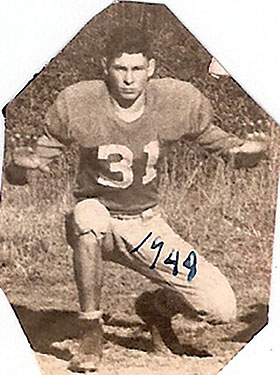
“We’re playing at Gardendale, both ranked, in the playoffs, and we go out and warm up in our white away jerseys,” Gulledge recalled. “We come in after we warm up and they’ve got probably the ugliest gold jerseys you’ve ever seen in your life to go with the gold pants we had. The atmosphere in the locker room, just because of the change of the jerseys… it created a lot of excitement and a lot of buzz, and we went on to win the game. But those kinds of memories and the plays that individuals made during high school, those are the things we cherish.”
One-hundred years of precious memories do linger. But more than championships captured and games won, there are generations of lives touched and a community unified. Regardless of the state of the world, color of skin, or station in life, Pell City could always come together to cheer for the Black and Gold. Those were the only colors that mattered.
“I think the main thing is that you’re a part of Pell City football ,whether you are a player or coach, or go to school there or just root for them,” Adamson said. “It is such an integral part of the community. That’s true of a lot of high schools, especially in smaller towns. But it seems for a lot of years, Pell City football was the focus of the community. Even out of football season, people were still talking about it. It was such a legacy situation. You would go to a game, and there were players and fathers and grandfathers who played for them.
“That’s true of a lot of places, but for me as a sportswriter and as someone who lived there, there was no escaping Pell City football. It permeated everything. You learned about the Black and Gold. You learned about the Panthers. It was the pride of the city. Even when the teams didn’t play that well, they still showed up. They still cheered them on. And those kids were looked at like, ‘You’re carrying on a tradition. You may not have the wins that other teams have had, but this is something you’re going to carry with you for the rest of your life.’”
Gulledge, who many regard as the greatest player in Pell City history, gets emotional when remembering his Pell City days. He remembers earning a Pell City letterman’s jacket as a privilege. Lessons learned on the playing field at Rich Alumni stadium serve him to this day as a regional executive for Coca-Cola. He is quick to point out that football, like life, is a team sport.
“(Football) is bigger than one person,” he said. “I’ve been blessed to be surrounded by really talented players, really good teams, really good coaches, through high school, through college and to the NFL at Washington. Now in my professional life, the Lord has really blessed me and shown me favor by putting great people around me.”
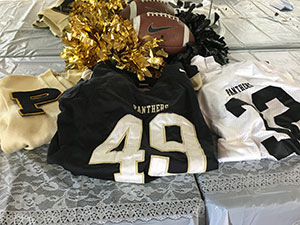 When he talks about Panther football’s impact, Gulledge’s voice cracks with emotion.
When he talks about Panther football’s impact, Gulledge’s voice cracks with emotion.
“As a mill-village kid growing up, there was a time when we were having family challenges and struggles. I was headed down a road of no good. Football was my avenue to get away from those things. Fortunately for me, Coach (Pete) Rich and Coach (Lyle) Darnell and the coaches who invested in me personally and into those other kids in that community and the community as well, for me is what high school football is all about.
“What high school football did for me is give me an opportunity to keep my nose clean and stay out of trouble. It was an avenue that gave me a platform to compete in life. “
Ask Bill Scott about the meaning of Panther football, and he thinks of the nights standing near the concession stand as he readied for another game on the chain gang. The autumn Friday night air was perfumed with the aroma of buttered popcorn, roasted peanuts and steamed hot dogs.
“I’ve told many a person, there’s no place I would rather be in the world at 7 o’clock than right here at the Pell City High School football field on Friday night.”















